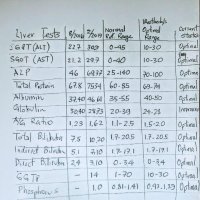Both Serum LDH and CRP are markers for inflammation. In a test last Saturday I got the ff results:
LDH - 229 U/L; Range 135-225
CRP <6; NEGATIVE
Question: If there is tissue destruction as indicated by the leakage of LDH from tissues, why is the CRP marker negative?
Is it possible that my liver is not producing CRP? Or are there cases where CRP is negative when LDH is high? When does such a situation occur?
LDH - 229 U/L; Range 135-225
CRP <6; NEGATIVE
Question: If there is tissue destruction as indicated by the leakage of LDH from tissues, why is the CRP marker negative?
Is it possible that my liver is not producing CRP? Or are there cases where CRP is negative when LDH is high? When does such a situation occur?


